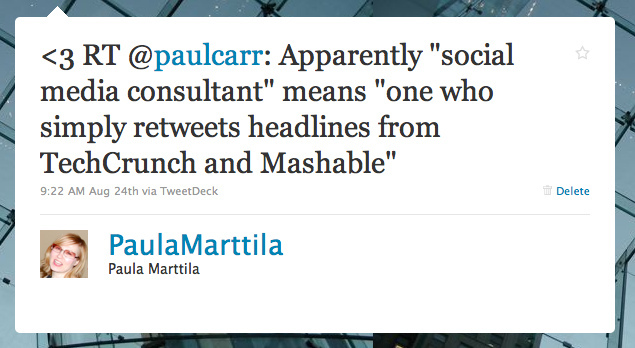“Why should I hire this consultant to build/manage my Facebook page–he can’t even run his own Facebook page.”
We’ve all heard the argument by now. If you can’t do it yourself, how are you going to tell your clients how to do it?
It’s been a common thread among social media-types the last few years. And, at some times, I’ve actually bought into it a bit.
But now, I’m here to tell you it’s a load of crap.
Which is a little odd, to be honest. Because, I’m the guy who comes in and says “you should value my advice because I’ve done this and that.” I don’t actually say it exactly like that, but I pride myself on being a consultant who practices what he preaches, so to speak.
But, I’m here to say those who preach but don’t necessarily practice aren’t incompetent. Not in all cases.
Why?
Let me paint two pictures for you.
First, think about your typical digital, advertising or PR agency. They’re busy with work–after all, it’s still a billable business model, right? They’re focused on meeting client needs. And, delivering new business. The last thing on their radar is their Web site. Or, their social profiles. Sure, these are part of the new business work, but what if the new business pipeline is full? Just because the agency isn’t participating online–does that make the agency incompetent?
Now, think about your typical VP in an agency or corporate environment. What’s their day like? They’re stuck in meetings for 80 percent of it. The remaining 20 percent is probably spent with their teams, managing their inbox and cranking out a little work, right? Remember, some of these people have lives and families outside of work, too. So, how in the heck do they have time to be sharing 15 posts on Twitter a day. Or, re-pinning content on Pinterest? I’ll answer that for you–they don’t. They’re spending most of their day doing their jobs–and some of that may involve coaching clients (internal or external) about social media. Since they’re not on Twitter all day, does that make them incapable of giving clients advice? Nope–not at all. You know what it does make them? In demand.
Let’s take a step back for a moment. The bottom line is this: Just because an agency doesn’t have a Facebook page with multiple tabs or a Pinterest page with 16 boards or an Instagram profile with 1,000 followers doesn’t mean they can’t consult on the topic/issue. It’s almost ridiculous to think that.
Instead of focusing your time and effort on what the agency is doing on their own social profiles, what you SHOULD do is your due diligence. I’ve got a few tips:
Look for senior-level experience
Really look into the agency’s experience. Do they have real experience with social, or is their experience amount to a bunch of junior-level associates doing all the work? Look at the senior level folks. Dig into their LinkedIn profiles. Even though you might work day-to-day with the junior or mid-level folks, it’s the senior-level counselors you’re going to rely on in times of great need.
Look for results
Do they just help brands “build” Facebook pages (I would think we’re past this stage by now, but who knows?), or are they helping clients realize REAL business results through social channels? I’m talking clicks, leads and actual business.
Look for *some* social proof points
They don’t have to be on EVERY network, but I think you need to see *some* proof that they “get” social themselves through their personal or agency interactions online. If the agency has NO profile online, then yeah, that’s a bit of a red flag. Just look for enough to make you feel comfortable.
What do you think? Is the “you can’t teach social media unless you participate in social media” myth busted? I’d love to hear what you think…
Note: Image courtesy of Paula Marttila via FlickR Creative Commons.


0 Comments